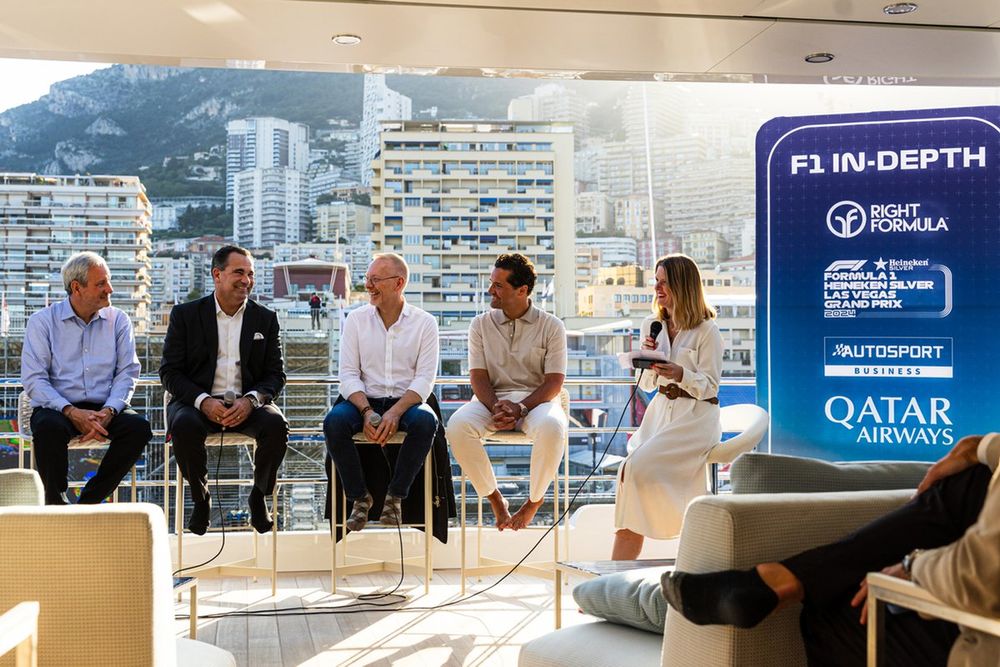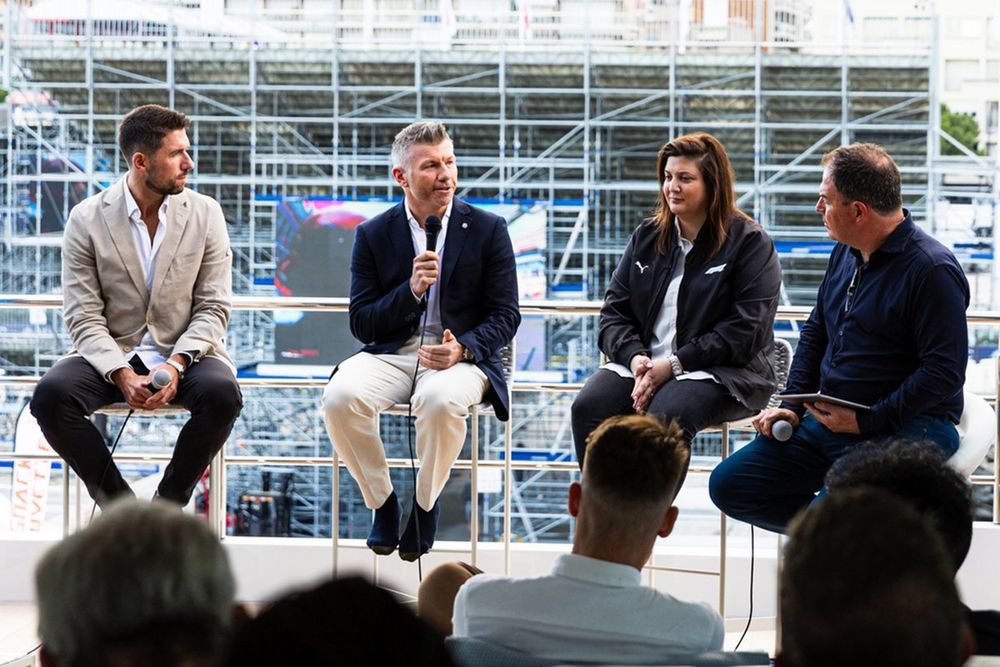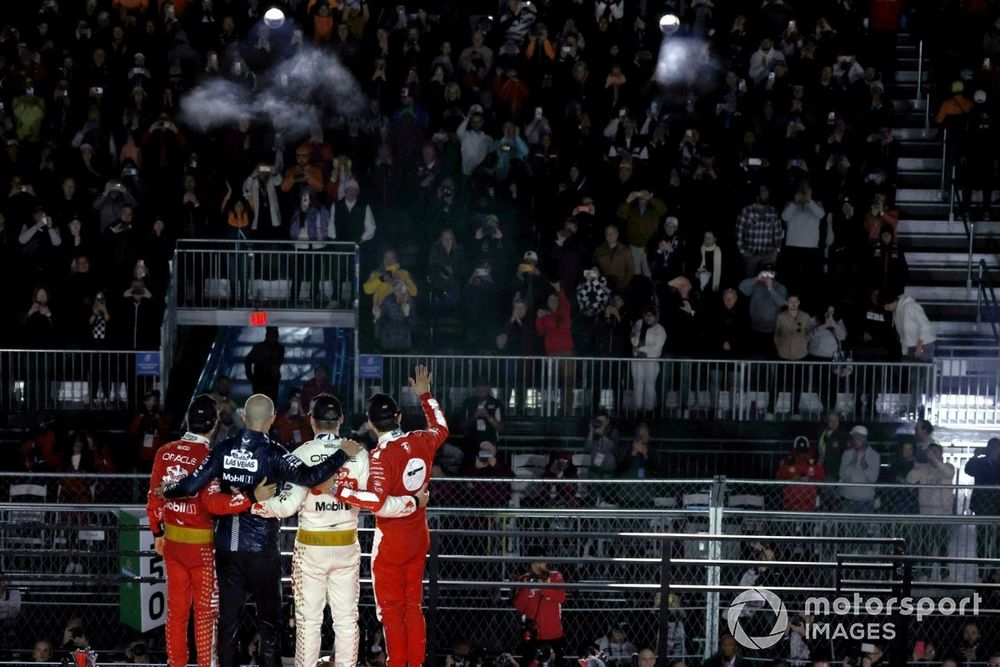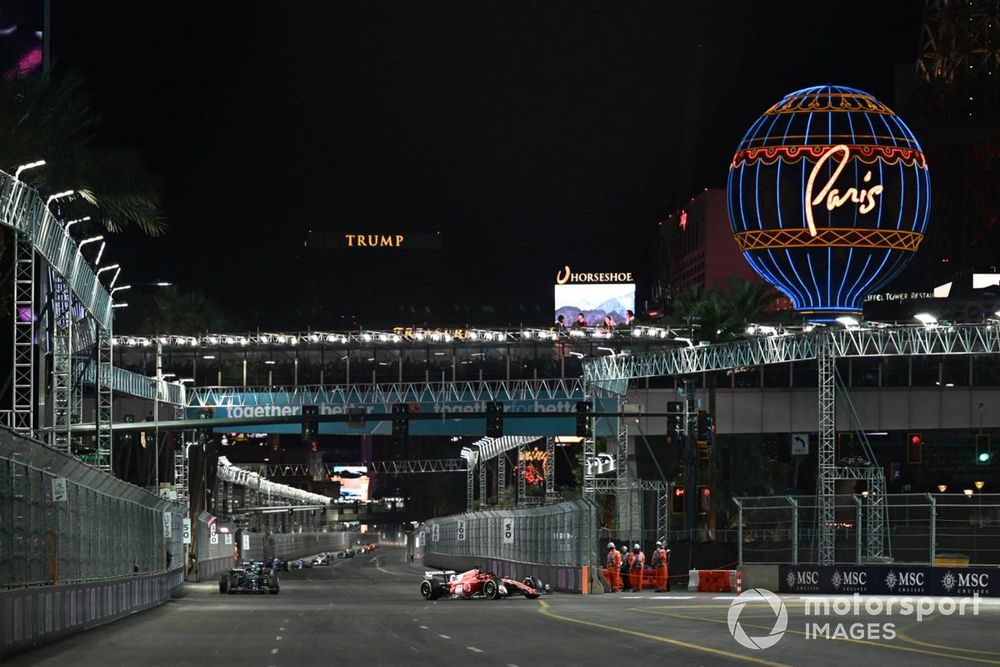Despite the early drama of the loose water valve cover that risked derailing the event almost before it got going, a spectacular race on Sunday helped it live up to the anticipation.
But perhaps the best news for organisers and the city came a few weeks later when a report concluded that the overall economic impact of the Las Vegas Grand Prix had been $1.5 billion – which was well up on the Super Bowl’s $1 billion injection.
The feel-good factor was obvious, but that is not to say that Las Vegas got everything right and is happy to sit back and automatically expect a repeat.
Indeed, as it braces itself for what can sometimes be a challenging year two for grands prix, it has taken on board some important lessons from what it felt it could have done better.
One of the key ones will be pricing: with there being an acceptance that everyone perhaps pitched things too high last year – both in terms of ticket prices and hotel rooms.
Speaking at a special F1 in Depth forum in association with Autosport Business at the Monaco Grand Prix, senior figures from the Las Vegas Grand Prix felt they were much wiser going into year two.
Sean McBurney, regional vice president of Caesars Palace, said: “We’re very happy with what we’re seeing so far. What I think is, if you go through the evolution of last year, everyone was very aggressive with pricing, and I think we all got that wrong.
“When you look at prices today, prices are closer to an average of where we ultimately ended, as everybody started very high. Then people ultimately had to lower their rates.”
Ticket prices are coming down too, with more general admission availability that should open up to the casual fan.

Formula 1 in Depth event
McBurney added: “With any major event, there’s going to be learnings. I think the biggest one for us was having a broader set of tickets available and packages, so that a broader set of the population could participate in the event.
“What you’re seeing now is about 7000 more GA tickets than what we saw last year. There’s a flamingo zone where single day tickets is $150, and three-day passes $600.
“What I think you’ll see this year is a broader spectrum of packages available, and more of the population, more of the fanbase able to participate in the event than what we saw last year.”
Las Vegas will also benefit from the fact that it has been through the event once now – so there are a lot more certainties in terms of logistics for the second year. The disruption that construction for the event caused, allied to the street closures, inevitably upset some locals.
But Brian Gullbrants from Wynn Resorts thinks things will be much calmer on this front for this year.
“Tearing up the strip for a year and then laying it down again to create the actual track was a monumental task,” he said. “I think that’s where the stresses and the angst came from the local community.
“But that doesn’t have to be done every year. I think now in the subsequent years, we have a much smoother race, and a much smoother ramp up to the race. I think things dissipate at this point.”
Brian Yost, from the Las Vegas Convention and Visitors Authority, added: “We will not be going through the same level of disruption we went through last year in terms of the track build. The track has been paved, it is now in good shape with all of the water valve caps secured. So we’ve eliminated that hurdle.
“We knew there would be a level of disruption, and that level will be reduced this year.”

Formula 1 in Depth event
Emily Prazer, chief commercial officer of F1 and the Las Vegas Grand Prix, has faith that there were elements in the creation of a new race that won’t be such a challenge second time around.
“I think that the community was nervous because it’s never been done before,” she said. “I don’t think anyone’s been as aggressive as this collective group to shut down Las Vegas Boulevard for the duration. So I understand why they had concerns.
“But my take on it is we’ve kind of proven the logistics side of it. Now we need to shorten the time of which it takes us to build things, which we’re working on.
“We’re working collectively on a much stronger community and comms plan which will launch at the end of June. So I’m not going to suggest it’s ever going to be perfect, because obviously everyone’s entitled to their opinion, but we’re going to try a lot harder to make sure that we pacify some of those nerves.”
F1 has learned some important lessons too about promoting the event and ticket sales – which is why it is holding back on its major marketing campaign for a little while.
Prazer added: “The difference from last year to this year is we had an 18-month window to start marketing and selling tickets. So we kicked off with quite a big launch party.
“The buyer trends we saw is that people tend to buy near at the time of an event, which I think you see with all of the shows from the resorts. So we’ve adjusted our marketing campaigns quite significantly to promote more post-summer break, so that we are not throwing money at something and not having the return just yet. But we’re seeing strong enough demand that we think will be pretty much sold out.”
The casinos also believe there is demand from guests who stayed away the first year because they were not sure what kind of event it would be.

Sergio Perez, Red Bull Racing, 3rd position, the Red Bull trophy delegate, Max Verstappen, Red Bull Racing, 1st position, Charles Leclerc, Scuderia Ferrari, 2nd position, on the podium
Photo by: Glenn Dunbar / Motorsport Images
Gullbrants added: “We heard from many of our regular guests and higher-profile guests that they were a little anxious going in the first year because of so much hype. Then they saw such a great race that now we’re hearing they’re actually coming.
“I think we get a whole other wave of people that were standoffish and now saw a really successful race. And they’re ready to come and join us now. I think we’ll get some repeat and I think we’ll get some new.”
And there is some good news for the drivers too, with F1 reckoning it will not need to be so flat out with all the razzamatazz elements that upset some of the big stars – and especially Max Verstappen – last year.
As Prazer said: “There was one particular driver that was very vocal that weekend. But I think we all saw by the end of it that he was singing ‘Viva Las Vegas’ on the radio.
“I think that they have different stresses with a new race as well. They had never driven the track and they didn’t understand what they were walking into.
“That being said, on the flip-side, they were incredibly supportive in the build up, doing promotions with us to help get the race up and running. They took part in our opening ceremony without complaint.
“Like anyone, I actually think there were a bit of nerves going into the weekend, as there was a lot for them to do. But none of them didn’t participate in activities we asked them to do.
“We’re definitely going to tone it down a little bit this year though. We definitely did way too much with them last year.”

Charles Leclerc, Ferrari SF-23, George Russell, Mercedes F1 W14
Photo by: Simon Galloway / Motorsport Images
While there are always improvements to be made, one thing is clear: Vegas is delighted with what F1 has done for it.
Steve Zanella from MGM Resorts International said: “What it truly did is clearly cemented Las Vegas as a sports entertainment capital in the world. And what we were able to show the world was amazing.”
Gullbrants added: “I think we all knew it was going to be exciting, but it was beyond. I think it delivered on many levels, hospitality, unbelievable race and exceptional environment, if you will. And for us, the city of Vegas, I think it was the exposure that we’ve never seen before.
“This was global exposure that I think we’ve never seen before and will continue to pay dividends for years to come.”








